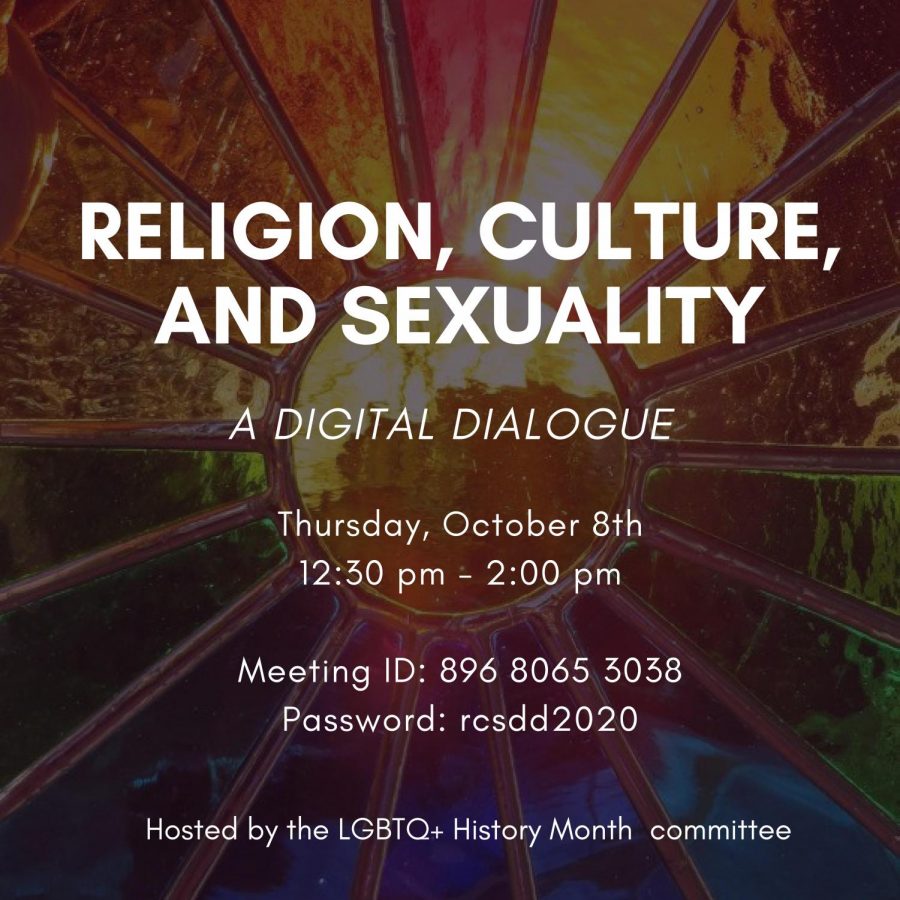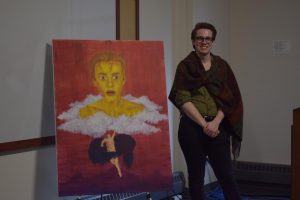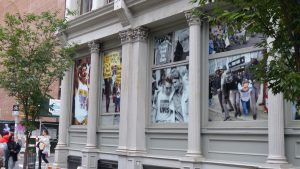Finding Space for Sexuality on a Jesuit Campus
The LGBTQ+ committee hosted a Digital Dialogue to discuss the intersection of religion and sexuality
COURTESY OF LGBTQ+ COMMITTEE
The virtual discussion hosted by the LGBTQ+ History Month Committee created a space for conversations about how religion and sexuality intersect, hoping to leave participants with a deeper understanding of their own identity.
October 15, 2020
“What does it mean to be gay on God’s campus?” Tyler Raciti, Fordham College at Rose Hill (FCRH) ’21, asked the participants of the “Digital Dialogue” event. For LGBTQ+ History Month, the planning committee hosted an event on Oct. 8 for students and professors to engage in a discussion on the intersection of religion and sexuality.
The panel consisted of three student leaders and one professor. The panelists and attendees shared their experiences and opinions about where and how religion and sexuality collide, the contradictions between the two, and if it is possible for the two to coexist.
George Kite, FCRH ’22, opened up about how growing up Catholic delayed his coming out to friends and family. He feared the perceived contradiction of “being gay and being Catholic.”
Since coming out, he says that his relationship to Christianity has become less centered around the Church and more about his personal relationship with Jesus, although he does still consider himself a Catholic.
Unlike Kite, Raciti explained that through the process of reconciling religion and his sexuality, he realized that faith could not fit into his life.
He said coming to Fordham prompted him to consider how he fits into Catholicism.
“I feel that religion is so important in people’s lives and I wish that it could be a part of mine,” he said. “How could I be a part of that if they have direct doctrines that are directly against who I am as a person?”
The tone of the conversation shifted when Christine Puri, FCRH ’21 and one of the dialogue’s hosts, asked about positive or hopeful experiences when religion and sexuality intersected.
“How could I be a part of that if they have direct doctrines that are directly against who I am as a person?” Tyler Raciti, FCRH ’21
Orit Avishai, professor of sociology at Rose Hill, discussed her research with queer Orthodox Jews in Israel. She explained that her original interest in this topic stemmed from working at a Catholic school, where she saw rifts between sexuality and religion on a daily basis.
Many of the activists Avishai talked to have either walked away from the religion or tried to find reconciliation. One of the positive experiences she’s witnessed is the creation of “new spaces within the orthodox tradition.” Avishai said this practice is called “making space” for the people who fall under the category of both Orthodox and LGBTQ+.
Jack McClatchy, FCRH ’21, opened up about how in his experience with the intersection of faith and sexuality, he was able to reconcile the two by using faith as a “guiding principle for reaching toward social justice.”
For him, the two don’t conflict as long as social justice comes first in his religious practices. This could be seen as another form of the “making space” Avishai mentioned earlier in the dialogue. However, the question remains whether that space can be found universally in religious institutions such as Fordham.
The Office of Multicultural Affairs at Fordham provides resources to LGBTQ+ students, such as events or programs that are intended to help these students feel comfortable within the Fordham community. Some of these programs are collaborative with Campus Ministry, for example, the PRISM retreat, which offers LGBTQ+ students a way to explore their relationship with spirituality.
However, Fordham rarely advertises these resources or encourages non-LGBTQ+ students to participate in ally programs.
A Fordham student who asked to remain anonymous due to the sensitive nature of the topic said that they felt Fordham has an obligation to advertise themselves as a safe place for LGBTQ+ folk.
“Fordham is a Jesuit institution affiliated with the Catholic church which is historically and currently homophobic,” the anonymous student said.
“There is something uniquely challenging with having such a connection with an identity that fundamentally cannot be yours.” Anonymous Student
In a College Confidential forum from 2009 regarding gay life on Fordham’s campus, the participants generally stated that Fordham’s campus is accepting of LGBTQ+ students. Responses particularly mentioned that on Fordham’s Lincoln Center campus, many gay or queer students do not experience any direct discrimination for their sexuality.
However, this is contrary to homophobic incidents reported by The Observer in the past. In 2012, a homophobic slur was written on the wall of a stairwell in McMahon Hall on the Lincoln Center campus.
The anonymous student said recognition of acceptance towards the LGBTQ+ community is currently missing in Fordham’s message because of its religious affiliation.
“There is something uniquely challenging with having such a connection with an identity that fundamentally cannot be yours,” another anonymous speaker, who severed ties with the church after coming out, said.
The LGBTQ+ History Month Committee stated that its goal is to continue hosting conversations like this one in the future to help students learn how to resolve their conflict between spirituality and sexuality.
















Ellen Long Stilwell • Feb 22, 2021 at 9:34 am
Good morning,
I am the mother of a gay son who attended Fordham/Rose Hill Campus. Stanley benefitted by attending the LGBTQ Retreat to Goshen. I am now the co-chair of the LGBT Catholics and Friends Ministry at St. Ignatius Loyola at 980 Park Avenue in Manhattan. We would like to explore an opportunity to meet/invite participation with each group.
I look forward to your response.
Thank you,
Ellen Long Stilwell